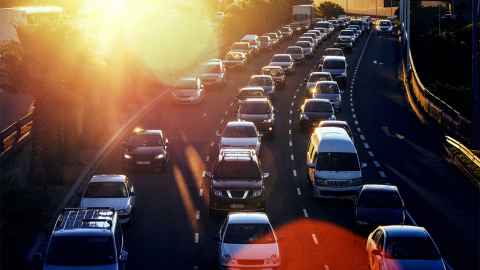The true costs of road congestion
30 November 2023
Uber-style surge pricing, adjusted in real-time according to road speeds and conditions, would be a good way to tackle congestion, writes Tim Hazledine.

OPINION: If you're considering driving your car onto a crowded motorway, you look at the traffic in front of you to see how fast it is travelling, because that's how fast you will be travelling if you do make the move. If that speed is acceptable you join the throng; if not, you go elsewhere.
What you don’t consider - unless you are some sort of saint - is the effect on all the vehicles immediately behind you on the motorway. But squeezing in will force them all to pull back to make room, adding a few seconds to their journey time.
Just tiny individual amounts, but added up over the thousands of commuters, this is the reason travel speeds at morning and afternoon rush hours may be around 30-40km/h rather than the open road limits of up to 100km/h. The resulting journey time increases are what are monetised to get the figure - which Mayor Wayne Brown puts at $1 billion/year - of the true costs of road congestion.
To be clear. You are not doing anything wrong. You are as entitled as anyone to claim your piece of airspace over the road tarmac. But it may be inefficient for you to do so. If, say, you impose time costs worth $5 on other motorists - economists call this an “externality” – and if you were now to be charged $5 for doing this - a congestion charge – then you would either pay up or not. If you pay, it means the benefits you get from taking to the road exceed the costs you impose on others, so it is efficient for you to do so. If not, then it is efficient that you choose another option - travel off-peak or ride the bus.
A congestion pricing system basically sorts out these trade-offs. So how should the charge be set in practice? The mayor has suggested a flat rate of $5 per rush hour trip, but I think we can do better than that. The payment system would be set up electronically, and so too could be the charging, adjusted in real-time according to actual road speeds and conditions, with commuters able to read off the latest prices from phone apps before they travel. Call it Uber-style surge pricing if you like - it is the smart thing to do.

However done, there would be two main results. First, rush-hour travel speeds would be higher, with fewer motorists on the roads. That’s good. Second, there would be a big pot of, basically free, money raised from those fewer motorists.
How much? I’d have to do the sums, but I would expect that, if the $1b cost figure is reliable (it may not be), then congestion charging would bring in about half this - say, $500 million/year. So, what to do with this? Being an economist, I suggest that it be handed back to the people of Auckland as a rebate on their rates. This would reward the splendid contribution made by the great majority of our citizens who do not use the commuter roads at all during rush hours.
But if this is politically unattractive: well, put it into improving the public transport system as the alternative to private vehicles for those who must travel at peak periods.
And, for heaven’s sake, don’t let us get cute about exemptions for people on “low incomes”, or pensioners, or any other worthy-seeming pressure group. If a super-annuitant is not still in the workforce, then they can probably make their trips off-peak. If they are still working - well, they can afford to pay the charge. People will adjust - just keep it simple, stupid!
If we had introduced congestion charging a decade ago, we would not have needed to build the ruinously expensive and disruptive underground railway. Okay, that’s water under the bridge now, but, talking about water and bridges – if we do bring congestion under control, we probably will not need to go ahead with ruinously expensive second-crossing schemes over or under Auckland harbour.
It’s great that Auckland’s mayor and councillors are finally getting serious about applying common sense to really one of our most manageable urban problems. Let us urge them on at full speed.
Tim Hazledine is Emeritus Professor of Economics at the Business School.
This opinion piece was first published by the New Zealand Herald. The opinions are those of the author and not necessarily of the University of Auckland.
Media contact
Sophie Boladeras I Media adviser
M: 022 4600 388
E: sophie.boladeras@auckland.ac.nz